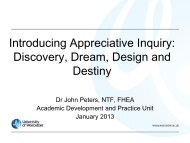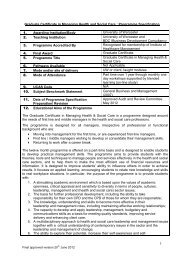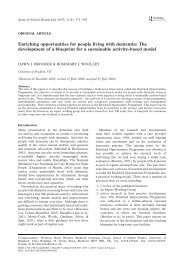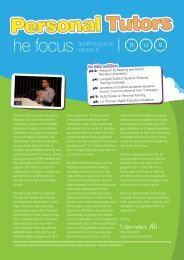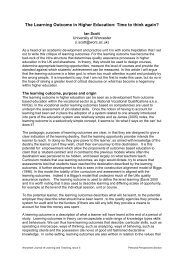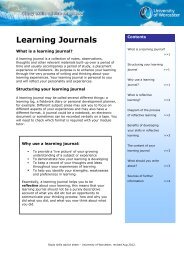Mentoring and Coaching stories - University of Worcester
Mentoring and Coaching stories - University of Worcester
Mentoring and Coaching stories - University of Worcester
Create successful ePaper yourself
Turn your PDF publications into a flip-book with our unique Google optimized e-Paper software.
suggestions rather than waiting for him to come to his own conclusions. Although this does notnecessarily devalue the experience for the trainee, the underst<strong>and</strong>ing gained from thesequestions may have had more impact if it had been directly generated by the trainee himselfrather than intimated by the researcher.Heather’s focus was very much on the development <strong>of</strong> her interpersonal skills <strong>and</strong> practice. Sheacknowledges progress in her underst<strong>and</strong>ing <strong>and</strong> a growing interest in the relationship betweenmentoring <strong>and</strong> coaching, empowerment <strong>and</strong> fostering learning independence.I felt empowered by the fact that my instincts about my level <strong>of</strong> empathy had been vindicated,however, it was in listening where I felt that there was actual development in my practice overthe two tutorials. This was clear not only in the amount <strong>of</strong> time during which I spoke whichdecreased from the first tutorial to the second by approximately 10 minutes but also in the“deep listening” (Eldridge <strong>and</strong> Dembkowski, 2003) or what is referred to in the <strong>Mentoring</strong> <strong>and</strong><strong>Coaching</strong> Framework (2005) as “active listening”.I was actually in the moment, listening to what was being said <strong>and</strong> then responding to it, ratherthan listening <strong>and</strong> trying to work out where the speaker was going next or what my ownresponse to them might be.Finally, Turnbull (2009) suggests that if the coaching relationship is successful then inevitablythe coach themselves will notice an increase in their own awareness. I feel that the process <strong>of</strong>trying to identify myself as a mentor-coach has equipped me with skills which will serve me wellboth pr<strong>of</strong>essionally <strong>and</strong> personally <strong>and</strong> I can say without doubt that the journey thus far hasbeen very enlightening.Can a friend become a mentor? An investigation into the relationship betweenmentoring <strong>and</strong> friendship.Rose Watson – Employability Development OfficerCan a friend ever become a mentor? If so, how does mentoring in an informal context differfrom organisational mentoring? Can a formal mentoring relationship lead to an equalfriendship?Rose explores a number <strong>of</strong> definitions <strong>of</strong> friendship <strong>and</strong> compares these with widely agreeddefinitions <strong>of</strong> mentoring such as ‘a more experienced individual willing to share their knowledgewith someone less experienced in a relationship <strong>of</strong> mutual trust’ (Clutterbuck, 1994), or <strong>of</strong>coaching ‘...to create a psychological space...providing a supportive yet challenging relationship<strong>and</strong> dialogue’ (West <strong>and</strong> Milan, 2001)So what is the relationship between friendship <strong>and</strong> mentoring? Undoubtedly both involveelements <strong>of</strong> trust, support <strong>and</strong> respect, <strong>and</strong> Agnes Missirian (cited in Clutterbuck, 1994) arguesthat there is some recognition that the most successful mentoring relationships can <strong>of</strong>ten leadinto strong friendships. The idea <strong>of</strong> ‘mutual trust’ mentioned by Clutterbuck (ibid) appears to becrucial, with Pahl (2000) suggesting that the development <strong>of</strong> friendship involves a spirit <strong>of</strong>mutual awareness.Rose goes on to explore the crucial differences between mentoring <strong>and</strong> friendship <strong>and</strong> relatednotions such as critical friend <strong>and</strong> pr<strong>of</strong>essional friendship. After gaining feedback from mentees<strong>and</strong> drawing on a reflective journal some key themes <strong>and</strong> underst<strong>and</strong>ings emerge. All involvednotions <strong>of</strong> support, listening, <strong>and</strong> confidentiality.<strong>Worcester</strong> Journal <strong>of</strong> Learning <strong>and</strong> Teaching, Issue 6Articles Section



